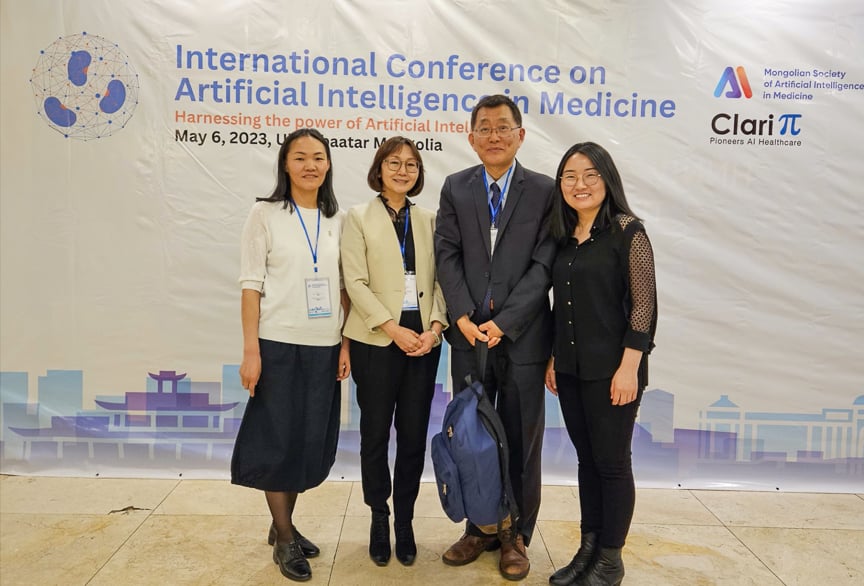Young Kim AI Meeting in Mongolia
 After a three-year hiatus due to pandemic, I finally had the opportunity to visit Mongolia in May 2023. I was fortunate to organize the first Artificial Intelligence in Medicine meeting in collaboration with leadership in Mongolia, Dr Khulan Khurelsukh, the vice President of AI conference, and Bayarbaatar Bold, the President of the Mongolian Society of AI in Medicine. Distinguished scholars from the US and Seoul and Mongolia were invited to speak, including, Professor Charles Kahn from the University of Pennsylvania. Top researchers from Seoul National University and Asan Medical Center also participated in this endeavor. Several experts from Mongolia, representing diverse specialties, participated as speakers.
After a three-year hiatus due to pandemic, I finally had the opportunity to visit Mongolia in May 2023. I was fortunate to organize the first Artificial Intelligence in Medicine meeting in collaboration with leadership in Mongolia, Dr Khulan Khurelsukh, the vice President of AI conference, and Bayarbaatar Bold, the President of the Mongolian Society of AI in Medicine. Distinguished scholars from the US and Seoul and Mongolia were invited to speak, including, Professor Charles Kahn from the University of Pennsylvania. Top researchers from Seoul National University and Asan Medical Center also participated in this endeavor. Several experts from Mongolia, representing diverse specialties, participated as speakers.
The opening remarks were given by the Uchral Nyam-Osor, Minister of Digital Development and Communication, a rare honor considering that it is uncommon to have an opening remarks from a Member of Parliament. This highlighted the government’s interest in the emerging era of Artificial Intelligence and its potential to revolutionize society in numerous ways. The regional director from WHO, Dr. Soccorro Escalante also delivered an opening talk, emphasizing broad impact of AI in medicine and society.
About 120 participants represented various medical disciplines, including radiology, internal medicine, public health. One fourth of the attendees were computer science professionals. Policy makers from the government and higher education institutions were also present.
I had the opportunity to chat with Ms. Bolormaa Tumendemberel, the President of Intermed Hospital, one of Mongolia’s most advanced private hospitals, who expressed gratitude for organizing the meeting and particularly providing UMass short-term visiting fellowships to young radiologists in Mongolia.
Following the conference, I received a collaborative research offer from a professor specializing in infectious disease and a researcher working for a nonprofit organization focused on finding AI applications in HCC detection. Chronic hepatitis and HCC are significant health concerns in Mongolia, and due to the shortage of well-trained medical professionals, they are exploring the potential of AI to address some of the unique challenges faced by the country.
I had a wonderful time reconnecting with former visiting fellows at UMass. One of the fellows, Dr. Javzandor Nyamsambuu (UMass Visiting 2019) has become the chairperson of a leading private hospital. I also met with professors who had mentored former UMass visiting fellows, and they expressed their gratitude for the opportunities provided by UMass Radiology Department to study abroad. While one-day symposium or a two-month visiting fellowship may not provide an extensive knowledge transfer, these connections allow us to collaborate towards enhancing healthcare services and mutually inspire each other in our efforts for self-improvement and education.
Helping Mongolian doctors not only benefits them but also profoundly impacts my own journey, confirming the true purpose and meaning of life. Providing small opportunities to these dedicated Doctors holds immense importance, igniting their motivation and personal growth. Witnessing their sincere efforts to improve the standard of living in Mongolia humbly reinforces my commitment to my role as a doctor and educator.
I would like to express sincerest gratitude to members of Mongolian Society of AI in Medicine, for their invaluable efforts in organizing the meetings and Professor Jong Hyo Kim, PhD, from Seoul National University for his unwavering support for this conference through his company.
I am deeply grateful to Dr. Patricia Sutman and her family for their dedicated service in providing room and board in their house for visiting fellows from Mongolia for several years.
Lastly, I extend my heartfelt gratitude to the speakers and attendees for dedicating their valuable time to participate in this endeavor despite their busy schedules





